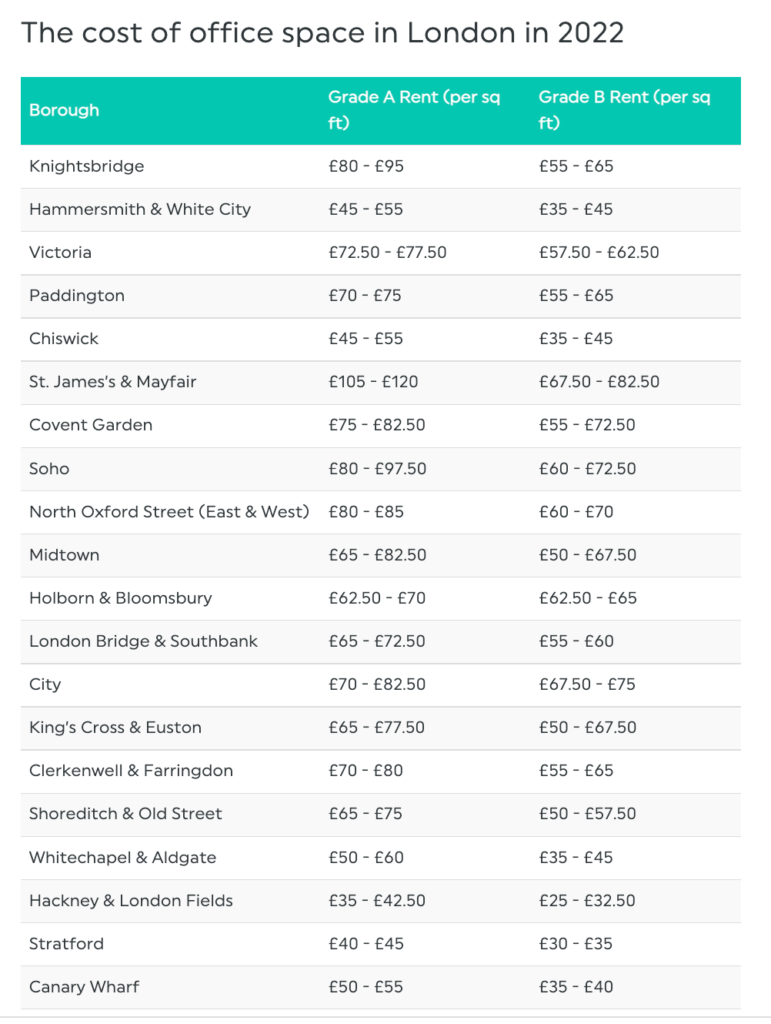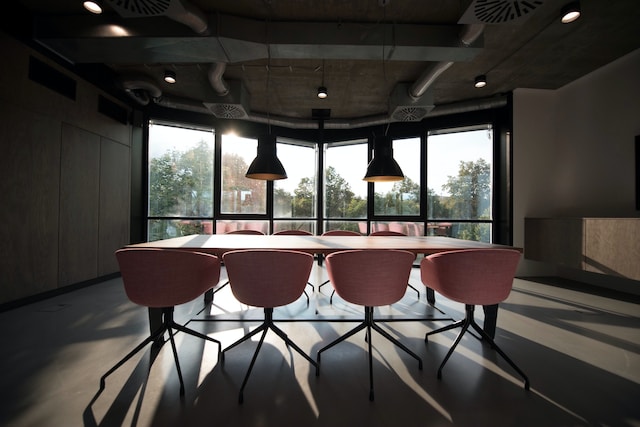Cutting costs as a start-up or small business can be difficult, especially since profits tend to be reinvested back into the business, leaving little left for rent. This problem can get more dramatic in the winter months when office spaces must be heated.
The Telegraph says that the average British startup spends £22,756 in its first year on set-up and administrative costs, not including payroll, product development, or marketing costs. This can put a tight squeeze on businesses to save money in other places. We detail 12 ways in which businesses can save money within the office.
Some of the costliest factors of running an office include:
- Office rent
- Electricity
- Computers and keyboards
- Office desks and chairs
- Employees
- Food, teas, coffees and lunches
Key Points
- It costs around £150 to £1,500 per employee to rent and office per month, with London costing around £500 per staff member per month
- Hybrid working can be much cheaper, helping both managers to save money on office space and running costs – and help employees save money on commuting
- Negotiating hard on your lease and sharing offices with other companies can help bring down costs

Source: Oktra
Promote Work From Home And Hybrid
If your employees can carry out their jobs at home, it could save a significant amount of money and save money for your employees.
For an employer, you can potentially use a smaller office size and maximise this space by having people only in the office on certain days per week. With a hybrid model, this can result in not only lower office cost rent, but also savings on things like food, electricity, computers, furniture, cleaners and more.
The average employee in London saves around £3,000 by working from home when calculating travel, train tickets, work clothes, lunches, office socials and more.
Consider a co-working space
Not every small business needs a big office. Businesses with small teams might save money by utilising a co-working space. Coworker.com has found that co-working can be 60–70% more cost-effective than the traditional office model for businesses up to 30 employees. This solution is perfect for start-ups.
This is because co-working spaces come ready with all the furniture you need, saving you the trouble of purchasing chairs, tables, cabinets, and other furniture. This not only saves money but time.
Additionally, you save money on cleaning and maintenance. Co-working facilities have their own cleaning staff, and they are in charge of fixing or replacing their furniture. They will also prevent your business from wasting money on bills for lighting, heating, and air-conditioning, as this will all be covered.
Move to the suburbs
Studies found savings of 50% per employee when office spaces in central London were replaced by suburban offices in popular areas such as Watford, Ealing, Chiswick or Surrey. This solution may not work for every business or their industry, but rent in the suburbs is dramatically cheaper than in city centres and lowers commute times and costs for staff and managers. You can also consider working just on the outskirts of town, such as offices in Finsbury Park or Kentish Town offices.
Ask workers to bring their own laptops
Businesses could save money by asking employees to bring their own laptops into work instead of providing them with work computers. A work computer can cost businesses hundreds of pounds per employee.
Most people own a personal laptop, so it could be worth asking employees to bring their own into work. This solution could come with some security concerns, so it should be done with caution.
Turn off your computers
Leaving your computers on overnight can be a huge drain on your energy bills. Ensuring that all the computers in your office are switched off overnight could be an area where businesses could make enormous savings with very little effort.
Negotiate your lease
If you currently have a 1-year lease with your landlord, you might be able to get a better deal with a longer lease. By working with a lawyer, you might be able to negotiate additional perks such as a rent-free period, or a cap on rent increases.
Post-covid and the rise of home working, there are a lot of strong negotiations and deals that can be made with office landlords. From restructuring your existing lease under better terms or being more competitive with the offer presented, you may be able to get an excellent deal on an office space.
Move up North
From HSBC to Amazon, big businesses are moving their London offices up north in a trend known as north-shoring. London office rents are the most expensive in Europe, says Statista. The property prices are dramatically different, despite the fact that the North is home to thriving and exciting cities.
Rents in the City of London are £65 per square foot on average, compared to central Liverpool’s £18 per square foot, or Manchester’s £30. The Telegraph claims that £500k will buy you a small two-bed flat in Clapham, or a Grade II listed three-bed house with landscaped gardens in Manchester.
Another way offices can save money by moving north is that salaries are much cheaper there. Expatistan found Manchester to be 31% cheaper than London, which explains and justifies the lower salaries paid to employees. Businesses can save money on the cost of talent by making the move.
Use natural light
Tall windows can reduce the amount of artificial light used in offices, saving on energy bills. However, this also provides the additional benefit of increasing the productivity and mood of your employees. It improves sleep, vitamin D levels, and eye health too.
Future Workplace, an HR advisory firm, conducted some research that found that natural light and views of the outdoors are among the most highly-sought workplace perks.
Choose your energy provider carefully
As the winter approaches, a huge percentage of an office’s bills will be spent on heating. Whether it is heating or boiler installation, a fast and easy way to save money is to have a look at all the energy providers on the market and choose the one that will be the cheapest for you.
Buy supplies in bulk
Bulk buying is an easy way to save on the unit cost of items such as furniture, paper, printer toner, or even monitors. Buying in smaller quantities is often more expensive. Wholesalers are able to give the best deals because they have the guarantee of being able to sell a large quantity of their products.
This is a great option for larger offices. Smaller offices might not be able to take advantage of offers such as these alone, but they can always team up with similar-sized businesses to get bulk deals.
Share your office with another company
It is very common to share your office with other companies, especially if they only need space for 1-3 days per week. This can be a big cost saving and also create a good energy and synergy with different people and personalities. It can also make your business look bigger when you have clients visiting!
